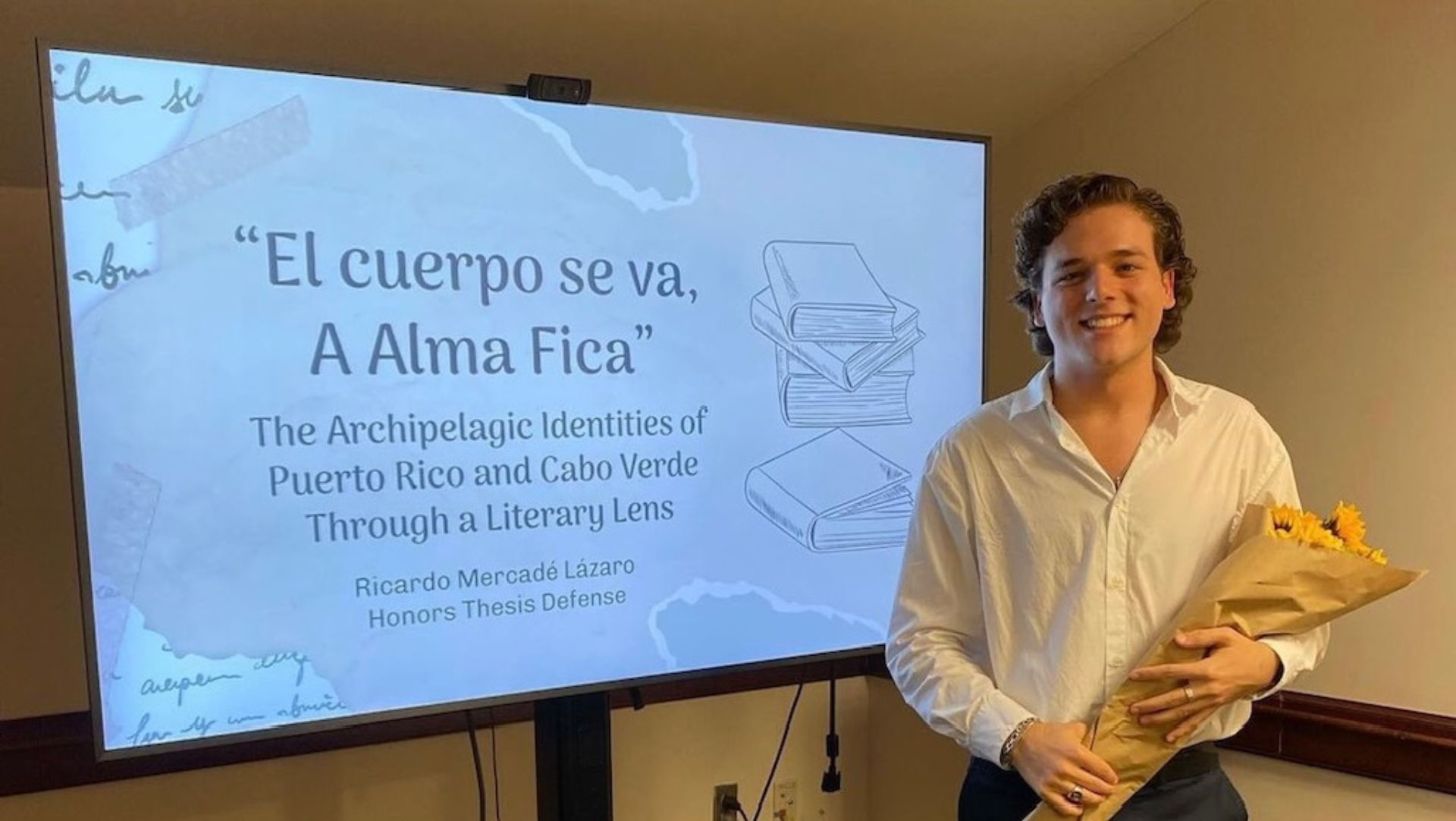
Honors Program
Honors Program
Advanced students are encouraged to pursue Honors in the Department. Writing an Honors thesis offers students the chance to:
- Conduct original research in a topic of their interest
- Engage deeply with methodologies of their discipline
- Work closely with faculty in their chosen field
- Produce a significant, original work of scholarship
Interested students must secure a faculty member who will be their advisor for the honors thesis as well as write a 1-2-page thesis proposal (approved by advisor and handed in to the Department Honors Coordinator) by the end of their junior year. It is advisable that students consult with faculty from whom they have previously taken courses.
The thesis may be written in Spanish, Portuguese or English, agreed in conjunction with advisor.
Students conducting research that requires travel or other expenses are encouraged to apply for funding through the Emory College SIRE program and/or Fox Center for Humanistic Inquiry. We also encourage students to present their research in April at the Undergraduate Research Symposium.
Contact Hernán Feldman (hfeldma@emory.edu), Department Honors Coordinator, with questions or to set up an informational appointment.
Honors Requirements
Eligibility:
- Major in Spanish, Spanish and Portuguese, or Spanish and Linguistics
- 3.7 cumulative GPA, maintained throughout senior year
- 3.5 average GPA in the major
Required courses:
- SPAN/PORT/LING 495A (Fall senior year) and 495BW (Spring).
- Spanish or SpanPort majors must take an approved graduate-level course.
- SPAN 495A does not count as one of the four 400-level courses required for the Spanish major.
Honors Students
Alondra Leyva “Música, memoria e (in)migración: explorando el cancionero del (in)migrante mexicano”
Chloe Helsens “Nossos Corpos Também São Pátria” – How Dino d’Santiago's Music Centers Blackness in a Reimagination of Portuguese National Identity
Daniel Archondo "National Myths of Mestiçagem and Mestizaje: A Comparative Study on the Genesis of Early 20th Century Brazilian and Mexican Anti-Racist Miscegenation Discourse"
Frances Chiu “Symptomatic Translation: Why Latinx Communities Seek Healthcare Abroad”
Kimberly Lopez “The Search For South-South Solidarities Between Contemporary (South) Korea and Mexico”
Owen Helsens “The Colors of Our Skin: Translation and Commentary of Color de Piel”
Ricardo Mercadé Lázaro “El cuerpo se va, A Alma Fica”: The Archipelagic Identities of Puerto Rico and Cabo Verde Through a Literary Lens.
Regina Morales "Transnational Motherhood and Daughterhood: Reimagining Familial and Gender Roles Across Borders Through Mexican and Brazilian Women's Oral Histories."
In her final year at Emory, Regina wrote her honors thesis on transnational motherhood and daughterhood using the oral histories of Mexican and Brazilian women living in the United States.
Grant Britton, "Los humores de la Mamá Grande: El uso del humor en los cuentos cortos de Gabriel García Márquez."
This thesis explores and analyzes how García Márquez employs subversive humor to provide a lighthearted critique of the social rigidity that is present in the institutions and customs of Latin American society.
Eliana Namen, "Portrayals of Trauma in Film as a Tool for Analyzing Imperial Residues of the New State in Portugal."
This thesis analyzes the ways in which two contemporary, co- produced films, The Night Train to Lisbon and O Julgamento discuss the breakdown of the Portuguese social fabric left by imperial residues of the New State regime.
Madison Cherry, "Regional Effects on Asylum Approval for Latin American Immigrants in the United States."
I plan to research the variation in the asylum granting process by region in the United States by concentrating on large variations in approval amongst the eight principal Asylum Offices and immigration courts.
Alyssa Forsyth, "Portrayal of the National Health Services (NHS) in Portugal's News through the First Wave of COVID-19: A Textual Analysis."
In this thesis, I compare the discussion of the Portuguese National Health Services (NHS) in articles published by five different Portuguese news sources across the political spectrum during the first wave of the COVID-19 pandemic to qualitatively gauge the perceived success of its response.
Nayive Gaytán "Tourism and a Telenovela: Representations of Tequila, Mexico."
Using visual analysis, I will identify how narratives conveyed through state-sponsored tourism and privately funded broadcast media projects promote symbols associated with Mexican national identity.
Claudia Michaels "Covid-19 and Inequality in Buenos Aires."
Summary: This project seeks to identify how the Covid-19 epidemic and subsequent government responses in Greater Buenos Aires have impacted measures of inequality by studying the distribution of Covid-19 cases across populations in the city with varying access to income, housing, healthcare, and government support.
Arianna Rahimian, "Del foro público a la esfera doméstica: un estudio comparativo sobre la vida cotidiana de las mujeres durante la Segunda República y el franquismo."
This project will investigate themes of family, sex and love, work, and education among working class women in urban centers in Spain. The legal, cultural, and social situations of women changed drastically during the first years of the Franco dictatorship after a relatively progressive Second Republic. I will use legislation, oral histories, literature, and film to characterize and compare the daily lives of women with special emphasis on feminist dissent.
Gwyneth Tefft, "Os retornados: Understanding Portuguese identity through the literary works of a colonial past."
My thesis will analyze topics of identity, race and colonial legacy within Portuguese society through the lens of the retornados, the group of Portuguese settlers who were living in Portugal's overseas territories and who were forced to flee Africa after the fall of the Salazar regime and onset of the decolonization process.
Completed Honors Theses
Undergraudate Honors theses are archived in the Emory Theses and Dissertations (ETD) Repository. Search for the names of the students below or for the terms Spanish, Spanish and Portuguese, or Spanish and Linguistics.
Aidan Fife "Cultivating the grassroots: Deep ecology and community networks in Latin America"
Benjamin W. Gitelman-Fonseca "The Practice of Liberation: Radical Pedagogy in Almanaque Escuela Para Todos"
Daniella Gonzalez "Defining Family Planning in a São Paulo Clinic: Healthcare Providers and Patients’ Varied Conceptualizations of “Planned” and “Unplanned” Pregnancies"
Alexandra Caridad Llovet "Stigma Continuity of Leprosy in Brazil, 1924-2018"
Samaresh Rao "Psychoanalysis in Buenos Aires: An Ethnographic Approach"
Emily Grace Vena "Language and Health: Investigating Patient-Provider Communications among Puerto Ricans"
Matthew Harrison Witkin "Haketia: An Ecological Perspective"
